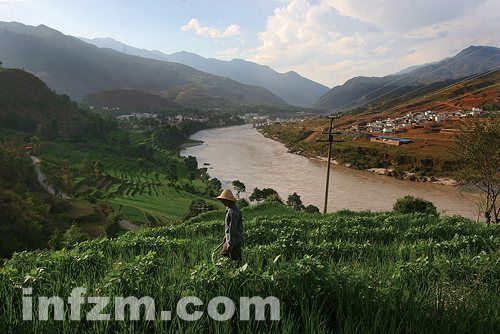
A farmer is working in his field near the Nujiang River.
(Ecns.cn)--The International Day of Action for Rivers on March 14 drew worldwide attention to development projects along the Nujiang River, also known as the Salween River.
The participants, including hundreds of communities and individuals around the world, tried to reach common ground on environmental and ecological protection of the river at the international, local and community levels.
Originating in the Tanggula Mountains in the Tibet Autonomous Region, the Nujiang River runs through Tibet and Yunnan Province and then flows into Myanmar and Thailand before entering the Indian Ocean.
With a drainage area of 33,500 square kilometers in Yunnan, or about 8.7 percent of the province, this section of the Nujiang is estimated to have a hydroelectric capacity of more than 42 million kilowatts, reported China National Radio.
Statistics show that about 90 small power plants have been built or are under construction on 66 relatively big branches of the river, with a total capacity of over 1.7 million kilowatts.
Yet hydropower projects on the river have caused controversy since 2003, when plans for a facility were halted after Chinese environmental groups objected, pointed out China Daily.
Li Bo, a nature conservation expert with Friends of Nature, an environmental NGO, told the newspaper that building hydropower stations on the Nujiang would definitely cause great damage to local biodiversity.
"For instance, many high-voltage transmission lines must be set up to transfer electricity. So trees on the way have to be cut down, which will be disastrous for birds," said Li, adding that the government needs to disclose more information on environmental impacts before building hydroelectric plants.
"Almost all rivers in China have been exploited for hydropower, except for the Nujiang River and the Yalu Tsangpo River, where Mother Nature is irreplaceable. Moreover, the Three Parallel Rivers of Yunnan Protected Areas, lying within the drainage basins of the upper reaches of the Yangtze (Jinsha), Mekong (Lancang) and Salween (Nujiang) rivers, is a UNESCO World Heritage Site, which would be damaged by hydroelectric projects," analyzed another expert.
The following year, the central government urged relevant authorities to carry out extensive investigations into the project's potential impact on the local environment and ecosystem.
During the NPC and CPPCC sessions this year, Qin Guangrong, Party secretary of Yunnan and NPC deputy, also claimed publically on March 10 that "no hydropower project has yet to be launched on the Nujiang."
Yet Shi Lishan, deputy director of the new energy department under the National Energy Administration, argued at a meeting earlier last year that the environment along the Nujiang in Yunnan had already been greatly damaged, since local residents live and farm on cliffs and steep mountains along both sides of the river, causing serious soil erosion and ecological harm, reported the China Daily.
Shi, quoting figures from the government of the Nujiang Lisu Autonomous Prefecture, pointed out that all forests there below an elevation of 1,500 meters had disappeared, and at least 600 locales in the prefecture are at risk of geological disasters.
"Some say the Nujiang people are not growing grain, but brewing disasters," he noted, "so proper development of the river is crucial to improving the locals' lives and protecting the environment."
Bai Enpei, former Party secretary of Yunnan, stressed during the "two sessions" in 2009 and 2011 that the hydropower projects on the Nujiang should be in the interests of the local environment and residents.
However, "power companies are the biggest beneficiaries of the projects, while local governments come next. Under the current system, it is hard for the general public to gain any profits," revealed Fan Xiao, chief engineer at the Sichuan Geopark & Geological Relics Survey and Assessment Center.
"When planning these projects, the companies, which focus on profit maximization, don't like to take the impacts of the power plants on local residents into consideration," added Zhao Jian, a Chinese geologist and environmental activist.
"That the local environment and people's daily lives have been affected shouldn't be treated with such little importance. And since many Chinese companies have chosen to set up power plants in disputed areas mostly inhabited by minorities, more conflicts are likely to occur," analyzed an environmentalist in Myanmar, who suggested that a thorough risk evaluation of a project's impact on local society and the environment should be carried out before construction.
"Many foreign investors in Myanmar only pay attention to flattering the government, while ignoring local people's interests in education, medical treatment and health," he said.
Another environmentalist from Myanmar called on the Chinese government to share more information about the Nujiang River to better exploit as well as protect the river.

Copyright ©1999-2011 Chinanews.com. All rights reserved.
Reproduction in whole or in part without permission is prohibited.